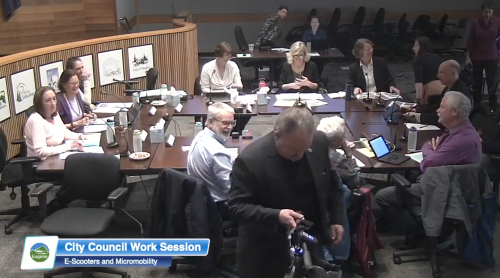
Eugene is one scoot closer to having e-scooters.
On Wednesday, Feb. 26, the Eugene City Council voted 6-2 at a work session to start the process of an e-scooter pilot program and change the city code to allow e-scooters and other electric powered devices on shared use paths. Councilors Betty Taylor and Greg Evans voted against both motions.
The next step is for the city to complete a request for proposals (RFP) that would invite scooter companies to bid for the contract to operate in the city, according to the city of Eugene’s transportation department. At the end of the pilot program, a report will be drafted to inform the City Council about future steps.
Eugene’s transportation planning manager, Rob Inerfeld, brought a VeoRide e-scooter to the City Council work session, which he said was provided by a company that wants the city contract. The scooter excited a few councilors and led Councilor Mike Clark jump up and joke that he was scooting out.
E-scooters aren’t new to cities like Portland but Inerfeld previously told Eugene Weekly that the city is pursuing e-scooters now because the market has matured. The program could launch summer 2020 and is meant to cut the community’s fossil fuel use.
During the work session, Inerfeld said that the city won’t buy e-scooters. The City Council is allowing companies to bring e-scooters to town, and the city would then impose a fee on e-scooter companies to cover the costs of implementing the program. The pilot program would be active citywide, and the city could prioritize working with companies willing to install e-scooters in low-income areas, especially neighborhoods impacted by LTD’s route changes.
But not everyone was excited about motorized scooters.
Taylor said e-scooters are hazardous to pedestrians and cyclists on shared paths.
“In Portland, I have seen them,” she said. “It was frightening to walk on the sidewalks there. I don’t know how you can keep them off the sidewalks.”
She added that the city of Eugene doesn’t have the infrastructure to keep e-scooters on the streets and off sidewalks.
As for parking, she said she doesn’t know where people would park e-scooters since it’s difficult to find a place for bikes and cars around places like the University of Oregon campus area.
Councilor Emily Semple said she was hit by an e-scooter at a Sunday Streets parade and has recently been feeling better so she’s concerned about e-scooter safety.
“I’m scared of them now,” she said.
Before voting, Semple said she received emails from residents asking her to vote against the program, but she decided to vote for it because it’s a pilot program.
Evans said he’s concerned about pedestrians sharing transportation space with e-scooters. He said while he was in Washington, D.C., he saw an accident between a person in a wheelchair and someone riding an e-scooter, as well as riders leaving e-scooters in places like bushes.
“A lot of people won’t ride in the bike lanes. They will ride on the sidewalks. They will do things that are dangerous and inappropriate, just like bicyclists do,” he said, “but there’s a different effect from a bicycle hitting you than a motorized device hitting you at a higher rate of speed.”
State law prohibits e-scooters from traveling faster than 15 mph and to ensure people aren’t speeding on shared use paths like Ruth Bascom Riverbank Path System, the city could ask scooter companies to use GPS technology to police speed.
Councilor Chris Pryor said the pilot program is a way to resolve e-scooter “butthead” behavior.
“I want to make sure we have sufficient safeguards in place so those people don’t create liabilities for the rest of us,” he said.
In 2019, the transportation department announced its plan to pursue e-scooters. The department then opened a survey for residents to weigh in on the EngageEugene webpage, which ran from Oct. 3 to Nov. 29, 2019, and had 541 responses.
Fifty-seven percent of responses were positive, but 27 percent of those were “interested, but concerned.” Forty-three percent of responses weren’t supportive of the program. Broken down by age, those against scooters are older: 64 percent of residents over 65 years old are against it, but 100 percent of those under 18 are for the program.
Common themes from negative responses are concerned about safety, parking, mobility and access, other cities’ experiences and money could be spent better elsewhere.
The city’s transportation staff also reached out to representatives of groups like Centro Latino Americano, Latino Professionals Connect and the Eugene-Springfield NAACP to learn how to be more inclusive with underrepresented community members. They also held listening sessions at places such as Lane Independent Living Alliance, which was attended by six people.
But the outreach and community responses isn’t enough to ease Taylor’s concerns.
“A six month pilot is long enough to terrorize a lot of people,” Taylor said before the City Council voted on the code change. “It might discourage people from riding bicycles because it’s dangerous. It might discourage people accustomed to walking, as I was in Portland.”